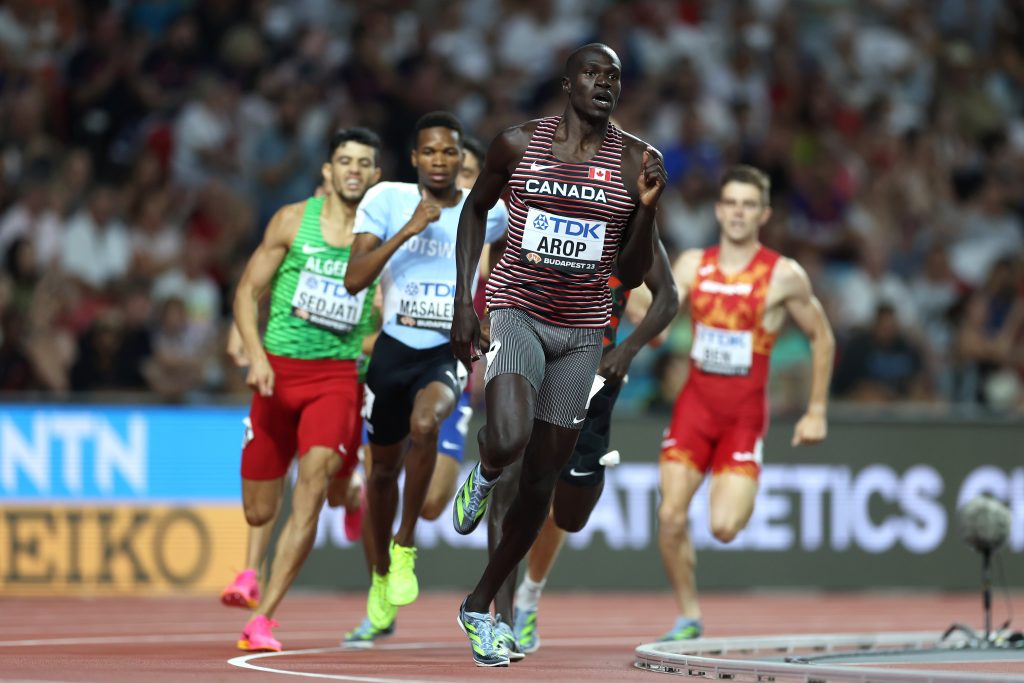Marco Arop Goes From Last to First to Win 2023 World 800m Title for Canada
By LetsRun.comBUDAPEST, Hungary – For the first time in 28 years, a Canadian man has won an individual running event at the World Athletics Championships. That man is 24-year-old Marco Arop of Edmonton, who won the 800 meters tonight in 1:44.24 thanks to an incredible 53.38-50.86 negative split. Arop came close last year by earning the bronze in Eugene but was on a different level in 2023. He looked unbelievable throughout the heats and went from last to first over the last lap in Saturday’s final. On this night, he was clearly the class of the field and the best in the world.
Arop’s gold was part of a glorious night for Canada, which also went 1-2 in the decathlon with Pierce LePage and Damian Warner and earned a silver in the shot put with Sarah Mitton. Before this week, Canada had won seven golds in the history of the World Championships. Tonight, they won two, and they have four total in Budapest including Ethan Katzberg and Camryn Rogers‘ wins in the hammer.
19-year-old Kenyan Emmanuel Wanyonyi, who came into the championships as the fastest entrant and had only one 800m loss all season, earned the silver medal in 1:44.53. Wanyonyi led at 400m, faded a little bit in the third 200 meters, but was able to respond with a strong final 200 meters. This is an upgrade from his fourth place finish last year in Eugene. Wanyonyi made it five straight World Championships where there is at least one Kenyan on the podium in the men’s 800m. 21-year-old Ben Pattison of Great Britain, who was competing at his first World Championships and squeaked into the finals as the slowest time qualifier, held on for the bronze medal with a time of 1:44.83. The 2022 Commonwealth Games bronze medalist was towards the front or middle of the pack for a majority of the race, and closed well to hold off many men surging in the final 100 meters.
The Race
The final went out slow, with the Kenyan teenage phenom Wanyonyi leading the pack of eight through 200m in 25.36. The more interesting part of the first quarter of this race was that Arop, who has a reputation as a front-runner, went straight to the back of the pack as the men rounded the first turn and cut in. He would hit the bell in last place.
Wanyonyi held his position on the inside rail through to the halfway mark in a comfortable 52.68. Pattison was in second position, and the shock qualifier for the final, Tshepiso Masalela of Botswana, was third and right on the shoulder of Wanyonyi. While those men were at the front and only separated by 0.22 seconds, Arop was in last place at the bell, 0.70 seconds behind Wanyonyi.
Once the bell rang, Arop began started to move up from his last place position, as he was sixth with 300 meters to go after running almost the entire first turn in lane 2. Once he entered the back straight, the tall Canadian made a very strong move from sixth to first as he overtook Wanyonyi on the outside. The move from Arop looked effortless, as he glided past the best 800-meter runners in the world. Arop’s move brought a few men with him, including Djamel Sedjati of Algeria, who placed second in this event last year. Sedjati was second to Arop with 200 meters to go, with Masalela and Wanyonyi close behind.
Arop’s move took something out of the legs of Sedjati, as Sedjati could not hold on to the pace around the final bend, as Wanyonyi, Masalela, and Pattison all passed him around the turn. However, at this point in the race Arop had opened up a five-meter lead to Wanyonyi in second. Gold was Arop’s for the taking, if he could avoid a repeat of last year’s final where he was walked down in the final 100 meters. As the men came into the final bend, Arop was the clear leader and Wanyonyi second, and it was no contest for Arop as he got the gold and Wanyonyi did closes slight on Arop at the end for the silver.
There was a tight race for the bronze medal. Pattison, Masalela, and Sedjati were all together entering the homestretch. Sedjati and Masalela would fade but Slimane Moula, who is known for his close, and Adrian Ben of Spain carried a head full of steam down the homestretch. Despite being the slowest qualifier into the final, Pattison held off the attack from those three men and crossed the line in third, just .08 ahead of Ben and .12 ahead of Moula, American Bryce Hoppel was never in contention for a medal, finishing last in 1:46.02.
| POS | ATHLETE | COUNTRY | MARK |
|---|---|---|---|
| 1 | Marco AROP | CAN | 1:44.24 |
| 2 | Emmanuel WANYONYI | KEN | 1:44.53 |
| 3 | Ben PATTISON | GBR | 1:44.83 |
| 4 | Adrián BEN | ESP | 1:44.91 |
| 5 | Slimane MOULA | ALG | 1:44.95 |
| 6 | Tshepiso MASALELA | BOT | 1:45.57 |
| 7 | Bryce HOPPEL | USA | 1:46.02 |
| DQ | Djamel SEDJATI | ALG | DQ |
Quick Take: Marco Arop was way better than everyone else tonight
Much will be made about Arop’s decision to go straight to the back, particularly because is known as a front-runner. He led until 100m to go in last year’s Worlds final and led at the bell in his last two Diamond Leagues before Worlds in Paris and Monaco, where he finished 2nd and 3rd. But Arop looked so good in the rounds in Budapest and was so dominant over the last lap tonight that he probably could have won this one from the front, too. He ran his final lap in a sick 50.86, and realistically it was closer to 404 meters than 400 because he ran most of the first turn in lane 2.
In his semifinal at the Tokyo Olympics, Arop was leading with 100 to go but ran out of gas and did not make the final – even though he was in great shape (he would win the next two Diamond Leagues after the Olympics). Arop’s coach Chris Woods said that after that race, they began experimenting with different race strategies – though not always at the biggest meets. At the Edmonton Athletics Invitational on July 2, Arop went out in last and mowed down the field with a 56-52 negative split, and Woods had felt all year long that it would take a negative split to win Worlds.
But Woods describes himself as merely the coach and Arop the quarterback who has the ability to audible the game plan as he sees fit. Arop decided to go to the back very early in the race.
“As soon as the gun went off, I just had a feeling that getting to the front wasn’t going to be easy and I didn’t want to be fighting with anyone for positioning early on so I just decided, take the inside and be strong,” Arop said.
Quick Take: The last four global 800m champions have all come through the NCAA system
Starting with Donavan Brazier’s win at the 2019 Worlds, the last four gold medalists in the men’s 800 have all come through the NCAA system. Brazier set a collegiate record of 1:43.55 to win the 2016 NCAA title for Texas A&M while 2021 Olympic and 2022 world champ Emmanuel Korir won NCAAs indoors and outdoors for UTEP in 2017.
Arop was very good in his two years at Mississippi State, but he never won an NCAA title – though he was runner-up outdoors in 2018 and indoors in 2019. Outdoors, he didn’t even make NCAAs in 2019 due to a hamstring injury but rebounded to run a 1:44.25 pb to win the Pan American Games followed by a 7th-place showing at Worlds in Doha, at which point he turned pro.
Quick Take: Ben Pattison thrives under pressure
Many of the UK athletes are only given the opportunity to go to Worlds if UK Athletics deems them of the potential to earn a medal. In many events, that is hitting the World Championship standard and finishing on the podium at the UK championships. Therefore, at the London Athletics Meet, Pattison, who had a SB of 1:45.05 at the time and was second at the British champs,, had to run sub-1:44.70 if he wanted to be chosen to represent Team GB in Budapest as GB would be naming its team the following week. He ran 1:44.02.
“I qualified for these championships on the last day, that’s when I knew I have that in me and I can pull out when I need to,” Pattison said. “Pressure seems to make me better. Running that time in London and qualifying on that stage when it was make or break, and I had to do it on that day, it shifted my mindset a lot.”
This was the biggest stage Pattison has ever competed on, and the 21-year-old could not have been happier to compete in Budapest. The huge crowd did not intimate him either, as he said, “the bigger the competition, the more at home I feel.”
Pattison ended a lengthy medal drought for Great Britain in the men’s 800 – no Brit had medalled in this event at the Olympics or Worlds since Peter Elliott in 1987. Pattison was born in 2001.
Pattison will continue his season at his first ever Diamond League in Xiamen on September 2 (his race in London was not a DL points event).
Quick Take: The United States’ men’s 800m struggles continue since 2019
Since Brazier won gold at the 2019 Worlds, the Americans have not had a great time in the men’s 800 at global outdoor championships. They put zero men in the semifinals at the 2022 Worlds, and while they did put Clayton Murphy in the 2021 Olympic final and Bryce Hoppel in tonight’s world final, both men finished last. Hoppel did earn a bronze at World Indoors last year, so it hasn’t been all bad, but the results have been lacking in the biggest races. Hoppel did not come through the mixed zone after the race.
800 Discussion: Is this the worst period for the 800m of all time?
*Hoppel goes home devastated
*Arop doesn’t always run from the front
*Marco Arop brings the gold home to Edmonton
Like this article? Would you like daily podcasts from Worlds? Join the LetsRun.com Supporters Club + you’ll save on running shoes and get a super soft running shirt.





